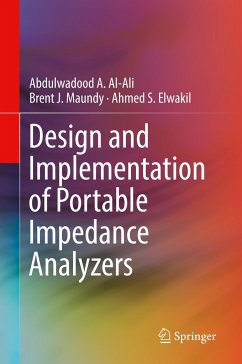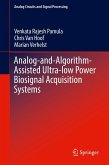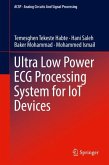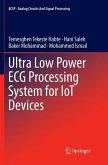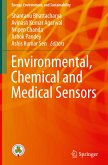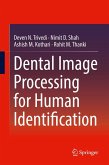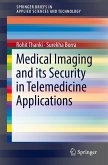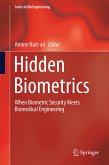Abdulwadood A. Al-Ali, Brent J. Maundy, Ahmed S. Elwakil
Design and Implementation of Portable Impedance Analyzers
Abdulwadood A. Al-Ali, Brent J. Maundy, Ahmed S. Elwakil
Design and Implementation of Portable Impedance Analyzers
- Gebundenes Buch
- Merkliste
- Auf die Merkliste
- Bewerten Bewerten
- Teilen
- Produkt teilen
- Produkterinnerung
- Produkterinnerung
The increasing interest in the bio-impedance analysis in various fields has increased the demand for portable and low-cost impedance analyzers that can be used in the field. Simplifying the hardware is crucial to maintaining low-cost and portability, but this is not an easy task due to the need for accurate phase and magnitude measurements. This book discusses different portable impedance analyzers design techniques. Additionally, complete designs using two different approaches are reported. The first approach utilizes a commercially available single chip solution while the second one is based…mehr
Andere Kunden interessierten sich auch für
![Analog-and-Algorithm-Assisted Ultra-low Power Biosignal Acquisition Systems Analog-and-Algorithm-Assisted Ultra-low Power Biosignal Acquisition Systems]() Venkata Rajesh PamulaAnalog-and-Algorithm-Assisted Ultra-low Power Biosignal Acquisition Systems75,99 €
Venkata Rajesh PamulaAnalog-and-Algorithm-Assisted Ultra-low Power Biosignal Acquisition Systems75,99 €![Ultra Low Power ECG Processing System for IoT Devices Ultra Low Power ECG Processing System for IoT Devices]() Temesghen Tekeste HabteUltra Low Power ECG Processing System for IoT Devices38,99 €
Temesghen Tekeste HabteUltra Low Power ECG Processing System for IoT Devices38,99 €![Ultra Low Power ECG Processing System for IoT Devices Ultra Low Power ECG Processing System for IoT Devices]() Temesghen Tekeste HabteUltra Low Power ECG Processing System for IoT Devices38,99 €
Temesghen Tekeste HabteUltra Low Power ECG Processing System for IoT Devices38,99 €![Environmental, Chemical and Medical Sensors Environmental, Chemical and Medical Sensors]() Environmental, Chemical and Medical Sensors75,99 €
Environmental, Chemical and Medical Sensors75,99 €![Dental Image Processing for Human Identification Dental Image Processing for Human Identification]() Deven N. TrivediDental Image Processing for Human Identification65,99 €
Deven N. TrivediDental Image Processing for Human Identification65,99 €![Medical Imaging and its Security in Telemedicine Applications Medical Imaging and its Security in Telemedicine Applications]() Rohit ThankiMedical Imaging and its Security in Telemedicine Applications38,99 €
Rohit ThankiMedical Imaging and its Security in Telemedicine Applications38,99 €![Hidden Biometrics Hidden Biometrics]() Hidden Biometrics90,99 €
Hidden Biometrics90,99 €-
-
-
The increasing interest in the bio-impedance analysis in various fields has increased the demand for portable and low-cost impedance analyzers that can be used in the field. Simplifying the hardware is crucial to maintaining low-cost and portability, but this is not an easy task due to the need for accurate phase and magnitude measurements. This book discusses different portable impedance analyzers design techniques. Additionally, complete designs using two different approaches are reported. The first approach utilizes a commercially available single chip solution while the second one is based on a new measurement technique that eliminates the need to measure the phase by using a software algorithm to extract it from the magnitude information. Applications to the measurement of fruit bio-impedance are emphasized and compared with measurements from professional stand-alone impedance analyzers.
Produktdetails
- Produktdetails
- Verlag: Springer / Springer International Publishing / Springer, Berlin
- Artikelnr. des Verlages: 978-3-030-11783-2
- 1st edition 2019
- Seitenzahl: 108
- Erscheinungstermin: 5. März 2019
- Englisch
- Abmessung: 241mm x 160mm x 12mm
- Gewicht: 280g
- ISBN-13: 9783030117832
- ISBN-10: 3030117839
- Artikelnr.: 54754812
- Herstellerkennzeichnung
- Springer Nature c/o IBS
- Benzstrasse 21
- 48619 Heek
- Tanja.Keller@springer.com
- Verlag: Springer / Springer International Publishing / Springer, Berlin
- Artikelnr. des Verlages: 978-3-030-11783-2
- 1st edition 2019
- Seitenzahl: 108
- Erscheinungstermin: 5. März 2019
- Englisch
- Abmessung: 241mm x 160mm x 12mm
- Gewicht: 280g
- ISBN-13: 9783030117832
- ISBN-10: 3030117839
- Artikelnr.: 54754812
- Herstellerkennzeichnung
- Springer Nature c/o IBS
- Benzstrasse 21
- 48619 Heek
- Tanja.Keller@springer.com
Abdulwadood A. Al-Ali received the B.Sc. degree in Electrical and Electronics Engineering from the University of Sharjah, Sharjah, United Arab Emirates and his M.Sc. Degree in Electrical Engineering from the department of Electrical and Computer Engineering at the University of Calgary, Calgary, Canada where he is currently Pursuing his Ph.D. degree in Electrical Engineering. He served as a reviewer for Wiley's International Journal of Circuit Theory and Applications, Elsevier's Integration, the VLSI Journal and IEEE Transactions on I&M in addition to some conferences. His current research is in bio-impedance measurement techniques and portable bio-impedance analyzers design. Brent J. Maundy received the B.Sc. degree in Electrical engineering and the M.Sc. degree in Electronics and Instrumentation from the University of the West Indies, St. Augustine, Trinidad, in 1983 and 1986, respectively, and the Ph.D. degree in electrical engineering from Dalhousie University, Halifax, Canada, in 1992. He completed a one-year postdoctoral fellow at Dalhousie University where he was actively involved in its analog microelectronics group. Subsequently he taught at the University of the West Indies, and was a visiting Professor at the University of Louisville for seven months. He later worked in the defense industry for two years on mixed signal projects. In 1997, he joined the Department of Electrical and Computer Engineering at the University of Calgary, Canada, where he is currently a Professor. His current research is in the design of linear circuit elements, high-speed amplifier design, fractional circuits and systems, active filters and CMOS circuits for signal processing applications. Prof. Maundy is a past Associate Editor for the IEEE Trans. on Circ. and Syst.-II. Ahmed S. Elwakil received the B.Sc. and M.Sc. degrees from the Department of Electronics and Communications at Cairo University, Cairo, Egypt and his Ph.D. degree from the Department of Electrical and Electronic Engineering, National University of Ireland, University College Dublin. He is currently with the Dept. of Electrical and Computer Engineering at the University of Sharjah, Emirates, where he is a full Professor. His research interests are primarily in the areas of Circuit Theory and Design, Nonlinear Dynamics, Chaos Theory, as well as Fractional-Order Circuits and Systems with diverse applications ranging from the modeling of oscillatory networks and nonlinear electronic circuits to modeling and characterization of energy storage devices and bio-materials. He is the author and co-author of more than 250 publications in these areas He is an Associate Editor for the Int. J. of Circuit Theory and Applications (IJCTA), published by Wiley, and the Int. J. Bifurcation & Chaos, (IJBC-World Scientific) Prof. Elwakil is an Associate Member of the Centre for Chaos Control and Synchronization at the City University of Hong Kong and has served as aninstructor for a number of courses organized by the United Nations University (UNU) and the International Centre for Theoretical Physics (ICTP, Trieste, Italy). He is currently an Associate Editor for the IEEE Transaction on Circuits and Systems: Regular papers and the Int. J. of Electronics and Communications (AEUE) by Elsevier. He was a keynote speaker at the sixth International Workshop on Chaos Fractals and Applications, Taiyuan, Shanxi, China, August 2013, a keynote speaker at the Int. Conf. on Fractional Differentiation and Its Applications (ICFDA), Catania, Italy, June 2014 and a keynote speaker at the 39 th International Conference on Telecommunications and Signal Processing (TSP), Vienna, Austria, June 2016 where he lectured on the theory of Fractional-order circuits and systems: An emerging interdisciplinary research area. He has been a member of the IEEE Technical Committee on Nonlinear Circuits and Systems (TCNCAS) since 2003. Prof. Elwakil was a lead guest editorfor the IEEE J. of Emerging and Selected Topics in Circuits & Systems, special issue on fractional-order circuits and systems (Sept. 2013); the first issue to be fully dedicated to this topic by the IEEE Circuits and Systems Society (TCAS) and was also a guest editor for a special issue on Chaos-Fractals Theories and Applications published in the J. of Mathematical Problems in Engineering, 2014. He was a guest editor for a special issue on fractional-order circuits (June 2016) in the J. Circuits Systems & Signal Processing (JCSSP-Springer) and has chaired/organized many special sessions in international conferences. Prof. Elwakil's paper "Construction of classes of circuit-independent chaotic oscillators using passive only non-linear devices," published in IEEE Trans. on Circuits & Systems in March 2001, was identified by Reuters-Thomson as the fastest moving front in Mathematics in January 2007. His paper "Fractional-order circuits and systems: An emerging interdisciplinaryresearch area," published in the IEEE Circuits & Systems Magazine is also among its top 50 cited papers ranking 7/50. He received the Egyptian Government first class medal for Achievements in Engineering Sciences in 2003, 2009 and 2015 respectively and was a visiting professor at Istanbul Technical University (Istanbul, Turkey), University of Calgary (Alberta, Canada), Queens University (Belfast, UK), Technical University of Denmark (Lyngby, Denmark), Ohio State University (Columbus, Ohio), University College Cork (Cork, Ireland), King Abdullah University of Science and Technology (KAUST, Saudi Arabia) and Nile University (Cairo, Egypt). He is currently an Adjunct Prof. at the Nano-electronics Integrated Systems Center at Nile University, Egypt and an Adjunct Prof. at the Dept. of Electrical and Computer Engineering, University of Calgary
Chapter 1. Bio-impedance measurement and applications.- Chapter 2. Direct impedance measurement design techniques.- Chapter 3. In-direct impedance measurement design techniques.- Chapter 4. Implementation examples.- Chapter 5. Conclusion.
Chapter 1. Bio-impedance measurement and applications.- Chapter 2. Direct impedance measurement design techniques.- Chapter 3. In-direct impedance measurement design techniques.- Chapter 4. Implementation examples.- Chapter 5. Conclusion.

